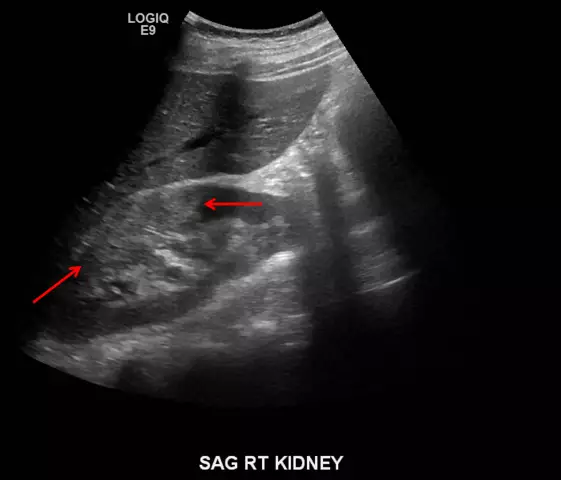- Author Rachel Wainwright wainwright@abchealthonline.com.
- Public 2023-12-15 07:39.
- Last modified 2025-11-02 20:14.
Herpes in pregnant women

Herpes is a viral infection characterized by rash of clustered vesicles on the skin and mucous membranes. The main areas of damage are lips, mucous membranes of the mouth, tongue, eyes, external genitalia. There are two types of human herpes simplex virus: labial (type one) and genital (type two). The herpes virus, regardless of its type, can be asymptomatic. At present, the herpes virus infection of the world's population exceeds 75%. Herpes virus of any type is not treatable. However, antiviral therapy effectively suppresses the virus in the body, preventing the manifestation of its symptoms.
The mechanism of infection with the herpes virus
Infection with any type of herpes simplex virus occurs through direct contact with an infected person. With the latent course of herpes, a person may not be aware of the existence of the virus in the body. Infection with labial herpes can also occur through airborne droplets and through household use when using other people's personal hygiene items, cutlery. With primary infection, painful blisters filled with clear liquid appear on the mucous membranes of the mouth, tongue, lips.
Infection with the herpes simplex virus of the second type occurs sexually through vaginal, anal or oral contact. In most cases, the causative agent of genital herpes is the herpes simplex virus of the second type (in rare cases of the first type). In this case, a condom does not provide complete protection, since herpes can manifest itself on areas of the skin that are not covered by a condom.
Exacerbations of both genital and labial herpes occur with hypothermia, stress, exhaustion, menstruation, other diseases, as well as factors that contribute to a decrease in immunity.
Herpes in pregnant women: possible risks
The herpes virus in pregnant women ranks second after the rubella virus (Rubella virus) in terms of the severity of pathologies caused in the fetus. During pregnancy, a woman's body undergoes a number of physical and hormonal changes that affect the body's immunity.
Herpes in pregnant women occurs in four clinical forms:
- The primary form of herpes is the infection of the body for the first time during pregnancy. The disease is characterized by the clinical manifestations of herpes (localized rash). There are no antibodies to herpes simplex virus types 1 and 2 in the patient's body;
- The first episode of the herpes virus - the infection of the body occurred before the onset of pregnancy with an asymptomatic course, and the clinical manifestations of herpes appear for the first time during pregnancy. The patient's body contains antibodies to the herpes virus of the first type and there are no antibodies to the herpes virus of the second type;
- Recurrent herpes in pregnant women - infection with the herpes virus occurred before pregnancy. During pregnancy, the virus is activated, and clinical manifestations occur. In the lesion focus, the analysis determines the presence of a virus of one of the types, antibodies to the herpes virus of the second type are present in the blood;
- Asymptomatic viral spread is the intensive multiplication of the virus and spread through the cells of the body. This form of herpes is typical for pregnant women with a history of recurrent herpes.
Labial herpes in pregnant women does not pose a danger to a child developing in the womb, even with its clinical manifestations in any period of pregnancy. Genital herpes in pregnant women is a great threat to the fetus.
So, genital herpes in pregnant women causes the following complications:
- fading pregnancy;
- miscarriage;
- premature birth;
- slowing down the intrauterine development of the fetus;
- underdevelopment of the child's brain - microcephaly;
- dropsy of the child's brain - hydrocephalus.
The herpes virus in pregnant women can be transmitted to the fetus in utero, during childbirth, in the postpartum period.
Antenatal (intrauterine) infection of the fetus occurs in 5% of cases. Herpes in pregnant women infected before pregnancy is suppressed by the antibodies produced. More often, infection of the fetus with the herpes virus occurs with the primary form of herpes in pregnant women, when the mother's body has not yet developed antibodies to the virus.
The largest percentage (75 - 90%) of transmission of the virus to a child occurs during childbirth when the fetus passes through an infected birth canal.

Postpartum infection of a child is extremely rare with non-compliance with hygiene rules and direct contact of an infected mother with an active form of the virus and a child. It should be noted that the herpes virus of any type is not transmitted in breast milk (except in cases where herpes sores are present on the mother's nipples and mammary glands).
With a recurrent form of herpes in pregnant women and timely preventive treatment of herpes in pregnant women, the likelihood of infection of the child both in utero and during childbirth is reduced to 0 - 4%.
Prevention of the herpes virus in pregnant women
For the prevention of the herpes virus in pregnant women, it is necessary to carry out tests to identify the presence and type of antibodies to the herpes simplex virus when registering. When a herpes virus is detected in pregnant women and on the basis of the collected history (the period of infection with the herpes virus, the number of relapses, triggers that provoke relapses), the doctor prescribes preventive treatment even if there are no clinical symptoms of the virus. It should be remembered that the number of drugs allowed during pregnancy is extremely small. That is why doctors strongly recommend an examination when planning pregnancy and preventive treatment of herpes infections, which will minimize the clinical manifestations of the herpes virus in pregnant women.
If a woman is not a carrier of any type of herpes virus, then it is extremely important to protect herself from infection with the herpes virus during pregnancy. Due to the fact that this disease in most cases is characterized by a latent asymptomatic course, the sexual partner may not be aware of the presence of the virus in the body. Both partners are tested to determine the virus. If a virus is detected in a partner during pregnancy, you must exercise the utmost care during sexual intercourse.
Treatment of herpes in pregnant women
When herpes is detected in pregnant women, the doctor prescribes antiviral therapy, including drugs for internal (pills) and external (ointments) use. In no case should the treatment of herpes in pregnant women be carried out independently. The doctor, based on the clinical picture of the disease, can prescribe various drugs for the treatment of herpes in pregnant women, among which the most popular are Panavir, acyclovir. For topical application, antiviral ointments are used to quickly heal lesions. In no case should the dose of prescribed drugs be exceeded in the treatment of herpes in pregnant women in order to avoid negative consequences.
YouTube video related to the article:
The information is generalized and provided for informational purposes only. At the first sign of illness, see your doctor. Self-medication is hazardous to health!






